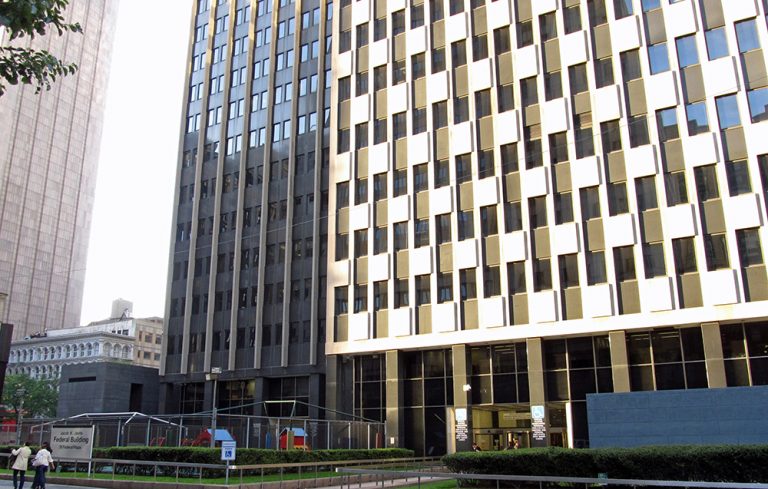

A U.S. Long-Standing Law Will Now Be Enforced, Immigrants Must Be Self Sufficient, Not To Rely On Public Resources
The Jacob K. Javits Federal Office Building at 26 Federal Plaza in the Civic Center, Manhattan, New York City is a forty-plus story structure which houses many federal government agencies, including the Department of Homeland Security, Federal Bureau of Investigation New York City field office. The federal building falls under the jurisdiction of the United States Federal Protective Service for any and all law enforcement and protection issues. | Ken Lund, Photographer | May 17, 2012
The U.S. Department of Homeland Security (DHS) announced a final rule that clearly defines long-standing law to better ensure that aliens seeking to enter and remain in the United States — either temporarily or permanently — are self-sufficient and rely on their own capabilities and the resources of family members, sponsors, and private organizations rather than on public resources.
This final rule amends DHS regulations by prescribing how DHS will determine whether an alien is inadmissible to the United States based on his or her likelihood of becoming a public charge at any time in the future, as set forth in the Immigration and Nationality Act.
The final rule addresses U.S. Citizenship and Immigration Services (USCIS) authority to permit an alien to submit a public charge bond in the context of adjustment of status applications.
The rule also makes nonimmigrant aliens who have received certain public benefits above a specific threshold generally ineligible for extension of stay and change of status.
“For over a century, the public charge ground of inadmissibility has been part of our nation’s immigration laws. President Trump has delivered on his promise to the American people to enforce long-standing immigration law by defining the public charge inadmissibility ground that has been on the books for years,” said USCIS Acting Director Ken Cuccinelli. “Throughout our history, self-sufficiency has been a core tenet of the American dream. Self-reliance, industriousness, and perseverance laid the foundation of our nation and have defined generations of hardworking immigrants seeking opportunity in the United States ever since. Through the enforcement of the public charge inadmissibility law, we will promote these long-standing ideals and immigrant success.”
DHS has revised the definition of “public charge” to incorporate consideration of more kinds of public benefits received, which the Department believes will better ensure that applicants subject to the public charge inadmissibility ground are self-sufficient.
The rule defines the term “public charge” to mean an individual who receives one or more designated public benefits for more than 12 months, in the aggregate, within any 36-month period (such that, for instance, receipt of two benefits in one month counts as two months).
The rule further defines the term “public benefit” to include any cash benefits for income maintenance, Supplemental Security Income (SSI), Temporary Assistance to Needy Families (TANF), Supplemental Nutritional Assistance Program (SNAP), most forms of Medicaid, and certain housing programs.
The regulation also excludes from the public benefits definition: public benefits received by individuals who are serving in active duty or in the Ready Reserve component of the U.S. armed forces, and their spouses and children; public benefits received by certain international adoptees and children acquiring U.S. citizenship; Medicaid for aliens under 21 and pregnant women; Medicaid for school-based services (including services provided under the Individuals with Disabilities Education Act); and Medicaid benefits for emergency medical services.
This rule also makes certain nonimmigrant aliens in the United States who have received designated public benefits above the designated threshold ineligible for change of status and extension of stay if they received the benefits after obtaining the nonimmigrant status they seek to extend or from which they seek to change.
Importantly, this regulation does not apply to humanitarian-based immigration programs for refugees, asylees, Special Immigrant Juveniles (SIJs), certain trafficking victims (T nonimmigrants), victims of qualifying criminal activity (U nonimmigrants), or victims of domestic violence (VAWA self-petitioners), among others.
This rule also explains how USCIS will exercise its discretionary authority, in limited circumstances, to offer an alien inadmissible only on the public charge ground the opportunity to post a public charge bond. The final rule sets the minimum bond amount at $8,100; the actual bond amount will be dependent on the individual’s circumstances.
This final rule supersedes the 1999 Interim Field Guidance on Deportability and Inadmissibility on Public Charge Grounds and goes into effect at midnight Eastern, Oct. 15, 60 days from the date of publication in the Federal Register. USCIS will apply the public charge inadmissibility final rule only to applications and petitions postmarked (or, if applicable, submitted electronically) on or after the effective date. Applications and petitions already pending with USCIS on the effective date of the rule (postmarked and accepted by USCIS) will be adjudicated based on the 1999 Interim Guidance.
USCIS will provide information and additional details to the public as part of public outreach related to the implementation of this rule. In the coming weeks, USCIS will conduct engagement sessions for the public and other interested groups to ensure the public understands which benefits are included in the public charge inadmissibility rule and which are not.
The San Marcos City Council received a presentation on the Sidewalk Maintenance and Gap Infill…
The San Marcos River Rollers have skated through obstacles after taking a two-year break during…
San Marcos Corridor News has been reporting on the incredible communities in the Hays County…
Visitors won't be able to swim in the crystal clear waters of the Jacobs Well Natural…
Looking to adopt or foster animals from the local shelter? Here are the San Marcos…
The Lone Star State leads the nation in labor-related accidents and especially workplace deaths and…
This website uses cookies.